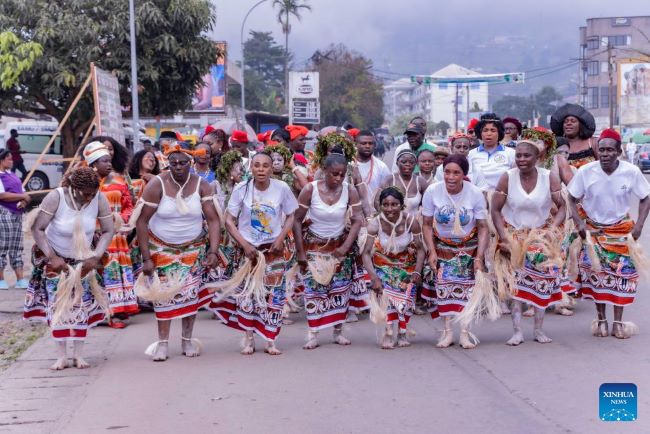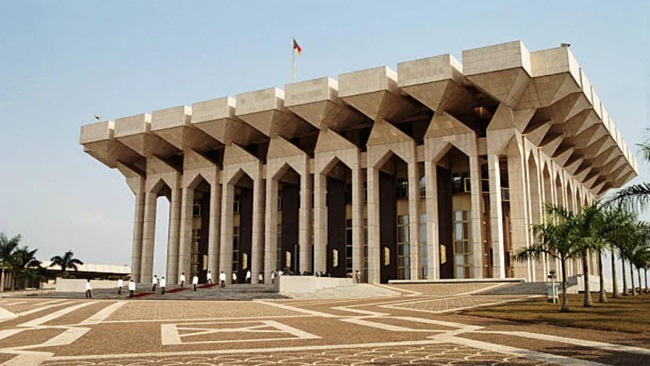2, August 2024
Bamenda Ecclesiastical Province: Archbishop Nkea highlights six levels of Communion 0
Archbishop Andrew Fuanya Nkea of Cameroon’s Catholic Archdiocese of Bamenda has outlined six levels of communion, which he said Catholic Priests share in their Priestly ministry.
In his Wednesday, July 31 homily during the opening Mass of the General Assembly of Priests of Bamenda Ecclesiastical Province (BAPEC), Archbishop Nkea highlighted Communion with the Trinity, Communion with the Church, Hierarchical Communion, Communion in the Eucharistic Celebration, Communion in the Exercise of Ministry, and Communion in the Presbyterate as vitally important in the ministry of Priests.
He described the July 31 – August 2 meeting as a “wonderful encounter of faith and fraternity”, and added, “The Priesthood is the strongest brotherhood in the world.”
“We are linked by that special fraternity which flows from the mystical oil of Chrism with which we were anointed during our Priestly ordinations, and nothing can weaken or separate us from this divine brotherhood,” the Cameroonian Catholic Archbishop said at St. Thomas Aquinas Major Seminary Bambui (STAMS) in Bamenda Archdiocese.
Communion with the Trinity
“The communion of the Priests is fulfilled above all with the Father, the ultimate origin of all his power, with the Son, in whose redemptive mission he participates, with the Holy Spirit who gives him the power for living and fulfilling his pastoral charity,” Archbishop Nkea said.
The Local Ordinary of Bamenda, who doubles as the President of the National Episcopal Conference of Cameroon (NECC) advocated for “pastoral charity” on the part of Priests.
“Far from being reduced to a series of techniques and methods serving the functional efficacy of the ministry,” he said, pastoral charity “refers to the nature proper of the mission of the church for the salvation of humanity.”
Communion with the Church
“The ecclesia communion of the Priest is lived in diverse ways. In fact, through Sacramental Ordination, he develops special bonds with the Pope, the Episcopal body, his own Bishop, other Priests, and the faithful,” he said.
Communion with the Church, the Archbishop of Bamenda emphasized, “is of utmost importance because without the Church the Priest cannot exist. We are Priests, and we can only experience this Priesthood in its fullness by being in communion with the Church.”
Hierarchical Communion
“Taking form in said ministerial communion are also some precise ties, first of all with the Pope, the college of Bishops, and Priests’ own proper Bishop,” he said referring to communion from the hierarchy viewpoint.
The 58-year-old Catholic Archbishop, who started his Episcopal Ministry in August 2013 as the Coadjutor Bishop of Cameroon’s Mamfe Diocese explained, “There can be no genuine Priestly ministry except in communion with the Supreme Pontiff, the Episcopal College, especially with one’s own Diocesan Bishop who deserves that filial respect and obedience promised during the right of ordination.”
“The Priesthood has absolutely no meaning if it is separated from that of the Bishop in whose Priestly ministry we share,” Archbishop Nkea said.
Communion in the Eucharistic Celebration
“Hierarchical communion is most meaningfully expressed in the Eucharistic prayers,” Archbishop Nkea said.
He explained, “When the Priest prays for the Pope, the College of Bishops and his own Bishop, he expresses not only a sentiment of devotion but attests to the authenticity of his celebration as well.”
“The Eucharistic celebration manifests the unity of the Priesthood of Christ in the plurality of his ministers as well as the unity of the sacrifice of the people of God,” he added.
Holy Mass, the Cameroonian Catholic Church leader said, “contributes to the consolidation of the ministerial fraternity existing among Priests. Without the Eucharist, the Priesthood has absolutely no meaning.”
Communion in the Exercise of Ministry
“Each Priest is to have a deep, humble, and filial bond of obedience and charity with the person of the Holy Father and adhere to his Petrine ministry of magisterium, sanctification and governance with exemplary docility,” he said.
Filial union with a Priest’s “own vision is also an indispensable condition for the efficacy of the Priestly ministry,” the Local Ordinary of Bamenda Archdiocese added.
“Priesthood without communion in ministry has no meaning. In this province of Bamenda we have a provincial pastoral plan that binds us in the exercise of our ministry, and therefore we share commitment in the exercise of ministry through this common pastoral plan,” he said.
Besides being an expression of maturity, Archbishop Nkea said, “This adhesion which entails proceeding in unison with the mind of the Bishop, contributes to the education of that unity in communion which is indispensable for the work of evangelization.”
Communion in the Presbyterate
“By virtue of the Sacrament of Holy Orders, each Priest is united to the other members of the Priesthood by specific bonds of apostolic charity, ministry and fraternity,” Archbishop Nkea said.
Priesthood, he said, is “a true family, in which the ties are not of flesh or of blood but come from the grace of Holy Orders.”
“Belonging to a specific Presbyterate always takes place within the context of a particular church, and not for reasons of incarnation, which in no way alters the fact that the Priest too, as a baptized person, belongs in an immediate manner to the universal church,” he explained.
Archbishop Nkea described the Priesthood as “a moving signpost”, and went on to explain, “The signpost stands on one place and indicates the road to heaven. But the Priest is a moving signpost. You are moving as you show the people the way to heaven.”
“You are also moving towards heaven. You cannot be showing the way to heaven, and you are moving towards hell,” he added.
Archbishop Nkea called upon Priests to “give up everything so as to enter heaven at the end of our lives. It will be a total catastrophe and a waste of life if we direct people to go to heaven and we find ourselves outside heaven.”
Source: aciafrica


























2, August 2024
Cameroon Bribery Scandal: UK billionaire charged with corruption over role 0
Alex Beard, the billionaire former head of oil at Glencore Plc, was charged with corruption by the UK’s top fraud agency, alongside four other ex-employees from the commodities trader.
The UK’s Serious Fraud Office accused Beard of conspiring to make corrupt payments to benefit Glencore’s oil operations in West Africa. The agency alleges he conspired to make the payments to government officials and employees of state owned oil firms in Nigeria between 2010 and 2014, and Cameroon between 2007 and 2014.
Beard, 56, who was one of Glencore’s top executives for more than a decade before his departure in 2019, is the highest profile individual to be charged in a sweeping series of investigations into corruption and market manipulation at the company – and one of the most senior commodity traders ever to be charged with wrongdoing.
Also facing criminal prosecution is Andy Gibson, 64, Glencore’s ex-head of oil operations and for years Beard’s second in command. The SFO charged him with four conspiracies of making corrupt payments in Nigeria and Cameroon between 2007 and 2014, and Ivory Coast between 2007 and 2010. He was also alleged to have conspired to falsify invoices between 2007 and 2011.
Additionally, Paul Hopkirk, Ramon Labiaga and Martin Wakefield, former Glencore employees involved in trading West African oil, stand accused of conspiring to make corrupt payments to government officials and employees at state owned oil companies in Nigeria, Ivory Coast and Cameroon.
Wakefield is separately charged with one conspiracy to falsify documents between 2007 and 2011.
All the men are scheduled to appear at Westminster Magistrates Court in London on Sept. 10. Lawyers for Beard and Gibson declined to comment. Lawyers for the other men didn’t immediately respond to requests for comment.
“Today’s action is an important step toward exposing overseas corruption and holding those who are responsible to account,” Nick Ephgrave, director of the Serious Fraud Office, said Thursday.
Glencore in 2022 pleaded guilty to corruption and market manipulation cases in the US and UK, admitting that it had paid bribes to win business in eight countries from Brazil to South Sudan and paying about $1.5 billion to resolve the investigations against it.
“Glencore cooperated with the SFO in its investigation into this past conduct and resolved its SFO investigation in 2022,” a Glencore spokesperson said noting the charges. “We are committed to acting ethically and responsibly across all aspects of our business and have taken significant action towards building a best-in-class Ethics and Compliance Programme.”
Until his departure from Glencore in 2019, Beard was part of the inner circle of former chief executive Ivan Glasenberg as one of a dozen department heads who made up Glencore’s management board. After working at BP Plc, he joined in 1995, becoming head of oil in 2007 and was known for his acumen trading Russian oil. When the company listed in London in 2011 he was revealed to be one of its largest shareholders with a stake worth $2.8 billion.
After leaving Glencore he started an investment company, Adaptogen Capital, to invest in large-scale batteries connected to the UK grid. He has been a major donor to Christ Church College at Oxford University and a trustee of Shakespeare’s Globe theatre in London. His net worth was estimated at £1.2 billion in the latest Sunday Times Rich List.
Beard’s role at Adaptogen Capital ended on July 12, according to a filing at Companies House.
“Alex Beard is no longer a director of the company having resigned in July 2024,” a spokesperson for Adaptogen said on Thursday. “It remains business as usual at Adaptogen.”
Source: BNNBloomberg